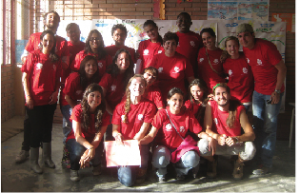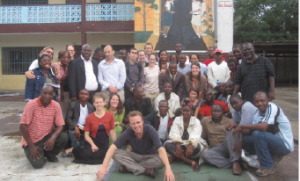Conflict Zone, Comfort Zone: Pedagogy, Methodology, and Best Practices in Field-Based Courses
Conflict Zone, Comfort Zone: Pedagogy, Methodology, and Best Practices in Field-Based Courses
 On February 22 and 23, 2014, the School for Conflict Analysis and Resolution welcomed 33 participants from ten national institutions to participate in a workshop entitled Conflict Zone, Comfort Zone: Pedagogy, Methodology, and Best Practices in Field-Based Courses. Convened by SCAR’s Undergraduate Experiential Learning Project, which is directed by S-CAR faculty members Susan Hirsch and Agnieszka Paczynska, this innovative round-table included a wide variety of participants from different theoretical and epistemological backgrounds, including representatives from Georgetown University, George Mason University, Nova Southeastern, UC Irvine’s The Olive Tree Initiative, Volunteers in Asia, the Connecticut Center for Nonviolence, Southern Connecticut State University, the University of Kentucky, Carlow University, Chatham University, and Providence College.
On February 22 and 23, 2014, the School for Conflict Analysis and Resolution welcomed 33 participants from ten national institutions to participate in a workshop entitled Conflict Zone, Comfort Zone: Pedagogy, Methodology, and Best Practices in Field-Based Courses. Convened by SCAR’s Undergraduate Experiential Learning Project, which is directed by S-CAR faculty members Susan Hirsch and Agnieszka Paczynska, this innovative round-table included a wide variety of participants from different theoretical and epistemological backgrounds, including representatives from Georgetown University, George Mason University, Nova Southeastern, UC Irvine’s The Olive Tree Initiative, Volunteers in Asia, the Connecticut Center for Nonviolence, Southern Connecticut State University, the University of Kentucky, Carlow University, Chatham University, and Providence College.
The workshop explored experiential learning and in particular field-based courses that take students out of the traditional classroom setting. Presentations focused on the ethical dilemmas students and instructors encounter in such courses, different approaches to course-design, and methods of evaluation and assessment of student learning. Participants discussed the challenges of teaching courses in conflict and post-conflict settings and the ways in which academic institutions offering such courses take on issues of accountability and responsibility for student learning, as relates both to partners in host-countries as well as to people directly affected by the conflicts.The workshop participants critically examined various experiential learning and field-based course models, theoretical frameworks, and case studies in order to better bridge the gap between theory and practice and, most importantly, move towards the development of ‘best practices’ for developing and implementing field-based courses in conflict analysis and resolution.
Ethics within Inequity
By moving students out of the traditional classroom, field-based courses provide students with a unique opportunity to ‘link theory to practice.’ Workshop participants discussed how such courses allow students to explore the ethics of practice in the real world and be sensitized to social disparities and power asymmetries in communities in which they engage in practice. At the same time, the very nature of field-based courses presents a number of ethical dilemmas. One of the key challenges that the participants discussed revolves around the ‘time-frame’ and ‘local collaboration’ nexus, focusing in particular on the tension between the ethical imperative of working with communities and the constraints of achieving community-based reciprocity given the short duration (usually 3-6 weeks) of field-based courses. In many instances, this tension can create pressure for development of a transactional course model, in which economic constraints and assessment measures supersede ethical aims and considerations, and ‘experience’ is treated as a commodity, which is marketed and sold to students as transformative. In such cases, the local communities are positioned as the ‘source’ of that experience and training for students. Such course models can reinforce structural power asymmetries by benefitting students at the expense of local communities, and some courses might amount to little more than an exercise in parachute peace-building and/or conflict tourism.
In order to move beyond transactional models, the panelists offered examples that shift who owns, orchestrates, and benefits from the experience by bringing in local community members as full participants in as reciprocal a relationship as possible. By designing programs geared towards ‘full participation,’ these initiatives shift from a model that positions local people as a source of data (with students doing the analysis and interpretation) and instead focuses on exchanges of knowledge and cross-cultural collaboration. An important goal of such learning is no longer limited to the experience alone but the development of collaborative knowledge, thus encouraging students to reflect upon their own positioning vis-a-vis their local counterparts as well as each other. The main objective of such a model is to create spaces whereby students can repeatedly interrogate experiences, bringing in and probing the interrelationship of culture, power, and position. In this model, students critically investigate the boundary between academics, activism, research, and practice. Workshop participants explored practice as an intellectual enterprise, particularly as pertains to the political economies of these programs, and raised hard questions about how such cross-cultural programs can operate ethically in contexts that are fundamentally unequal and embedded within broader asymmetrical power systems, whether in the United States or abroad. Workshop participants gave clear examples of how courses focused on social justice in U.S. communities must also address student and faculty assumptions about poverty, class, incarceration, and security.
Re-framing Engagement
The challenges of field-based learning are distinct from those that students and instructors encounter in the traditional classroom. Once students are working in a community, they encounter real people and real conflicts. The workshop participants explored how best to prepare students to engage in practice in these contexts where decisions often need to be made quickly and under pressure, when there are no opportunities for ‘do-overs,’ as can happen during simulations or role play activities in the traditional classroom, and when ‘mistakes’ made can have negative and lasting implications for the community, students, and the academic institution-community relationship. A key question students explored was how to teach students to recognize the limits of their knowledge and of what their interventions can achieve. For those students who are deeply committed to social justice, perhaps the greatest challenge is to recognize and respect the power dynamics in the community in which they are working and appreciating that as outsiders they can do more harm than good if they try to advocate for complex changes in the very limited time frame of a field-based course. By jumping in with the aim of solving a problem, a number of participants noted, students may inadvertently exacerbate tensions. Instructors face the challenge of helping students to understand their circumscribed role as practitioners and that they are not entering a community to ‘solve’ a community’s problems but rather to facilitate the community's moving toward addressing its conflicts.
the traditional classroom. Once students are working in a community, they encounter real people and real conflicts. The workshop participants explored how best to prepare students to engage in practice in these contexts where decisions often need to be made quickly and under pressure, when there are no opportunities for ‘do-overs,’ as can happen during simulations or role play activities in the traditional classroom, and when ‘mistakes’ made can have negative and lasting implications for the community, students, and the academic institution-community relationship. A key question students explored was how to teach students to recognize the limits of their knowledge and of what their interventions can achieve. For those students who are deeply committed to social justice, perhaps the greatest challenge is to recognize and respect the power dynamics in the community in which they are working and appreciating that as outsiders they can do more harm than good if they try to advocate for complex changes in the very limited time frame of a field-based course. By jumping in with the aim of solving a problem, a number of participants noted, students may inadvertently exacerbate tensions. Instructors face the challenge of helping students to understand their circumscribed role as practitioners and that they are not entering a community to ‘solve’ a community’s problems but rather to facilitate the community's moving toward addressing its conflicts.
The workshop participants critically evaluated the responsibility of the academic community to produce prepared practitioners and to develop ‘best practice’ frameworks that treat field-based courses as integral to the overall program of study for a nascent practitioner, rather than as a discrete event. Taking this perspective means setting a premium on pre-trip awareness-building, as students can often mistake culture as uni-dimensional and consequently fail to recognize that culture is diverse and shaped by power relations. Pre-trip activities can acquaint students with unfamiliar norms and values that local community members might hold and that might be a source of conflict. Students unprepared for what they might experience can be transformed negatively during experiential learning; students can actually use the experience to validate pre-conceived notions, biases, and stereotypes. Effective preparation involves engaging and confronting students’ pre-trip assumptions and the tensions these might create, given that interaction across lines of difference, such as religion, language, class, gender, and culture in practice necessitates moving beyond superficial understandings toward intersubjective experiences that seek to probe the nature of assumed differences.
The Olive Tree Project at UC Irvine begins to involve students months before they embark on an intensive trip to many communities in the Middle East. As students work together to raise funds for their trip, they learn not only about the communities they will visit, but also about the perspectives of diaspora populations in the United States. The need for preparation is not limited to students, however, as faculty need to be prepared for much more than the academic aspect of the course in order to avoid risk, unpredictability, contrary reactions, and uncomfortable situations. Faculty from S-CAR noted that classroom-based experiential learning activities can provide opportunities to raise some of the key issues prior to a trip.
Towards Best Practices
A clear goal of these discussions is to develop ‘best practices’ that are both accessible and implementable by instructors across a range of fields that operate such courses in conflict and post-conflict settings. Such a publication would be geared towards sharing insights from active practitioners, academics, administrators, and local partners in order to provide a guide for starting or expanding a program that would address how to generate funding, construct pre-trip preparation, post-trip reintegration and best-practices in choosing local community partners and reciprocal sustainability. This project has further sparked interest in generating new frameworks, methods, and processes for project evaluation which would take into account the intent and product of field-based courses. As the expectations of what ‘learning’ entails has changed theoretically, students, instructors, institutions, and funders need to see illustrations of what evaluation looks like in practice. Since the creation of successful and ethical field-based courses necessitates a process of pre- and post-testing for such community projects, a guide that includes critical discussions of best practices, pedagogy, methodology, and real case-study evaluations would be an invaluable addition to the CAR field. Workshop organizers hope to publish the presentations and additional commentary in an edited volume in the near future.






